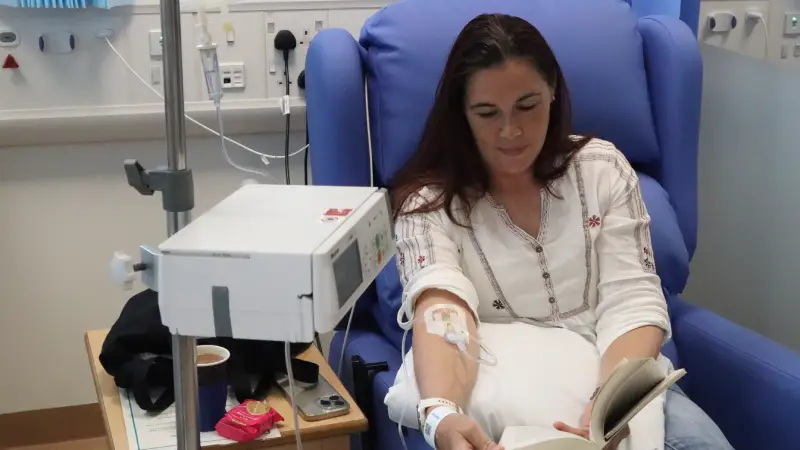A team of doctors in Cambridge are calling for changes to how Crohn’s disease is treated following an economic analysis of recent ground-breaking research.
The analysis shows that early effective treatment of newly diagnosed Crohn’s disease prevents complications before they occur and could save the NHS £2,000 a year per patient, while improving patient outcomes and quality of life.
Crohn’s disease, a form of inflammatory bowel disease (IBD), is a lifelong condition that affects around one in 350 people in the UK. With symptoms including tummy pains, diarrhoea, weight loss and fatigue, Crohn’s disease can significantly impact quality of life, including having a major bearing on relationships, education and employment opportunities.

If these treatments had been available when I was diagnosed, my life could have been very different. I hope this trial will mean many more people with Crohn’s disease can avoid the years of constant discomfort, pain and worry that I went through.
Isobel Wright was diagnosed with Crohn's disease in the 1990s
In 2024, a team of researchers at Cambridge University Hospitals NHS Foundation Trust (CUH) reported the result of the PROFILE trial, showing that providing access to early treatment for Crohn’s disease immediately after diagnosis was five times more effective at helping patients control inflammation compared to existing treatment methods and reduced the need for urgent abdominal surgery 10-fold.
Now, an economic analysis of the results has shown that this approach not only make lives better for patients but has the potential to save millions of pounds by reducing the cost of patient care by up to £10,000 per patient over a five-year period.

We have shown that by effectively controlling disease from the point of diagnosis, we can deliver good outcomes and high quality of life for people living with Crohn’s disease.
Dr Nuru Noor, clinician at CUH and NIHR Clinical Lecturer in Gastroenterology at the University of Cambridge
With approximately 190,000 people in the UK living with Crohn’s disease, and 10,000 newly-diagnosed annually, this could save the NHS as much as £20m each year.
The results are published today (23 October) in the Journal of Crohn’s and Colitis and the team are now calling for national reimbursement guidelines to be updated to encourage more widespread use of this more proactive approach to treatment from the point of diagnosis.
Crohn’s disease is an inflammatory illness, where overactivation of the body’s immune system leads to damage to the bowel. This inflammation can also impact on many other parts of the body giving rise to symptoms that affect the gut but also commonly skin, joints, eyes, liver and more. The extent and severity of the disease varies greatly between patients, with many patients experiencing intermittent worsening of their symptoms, called ‘flares’.
Professor Parkes and Dr Noor explain the results of the PROFILE trial
Link: https://youtu.be/lM87hi2JBbo
Patients can often manage their symptoms with effective medication used at the right time but patients may need surgery to remove parts of their bowel. In severe cases, this occurs after patients are admitted to hospital and then require urgent abdominal surgery.
Recent management of Crohn’s disease has involved a ‘step-up’ approach to care, where stronger medications are used only when a patient experiences worsening symptoms due to a flare or after they have developed a disease complication.
PROFILE showed that a ‘top-down’ approach is far superior and leads to much better outcomes for patients. In this approach, patients start regular treatments with biologic medications such as infliximab or adalimumab as soon as possible after diagnosis. These medications work to control inflammation, and help reduce the effects of disease, and prevent complications from occurring.

Our results from PROFILE have been globally impactful. There is now huge international support to make early effective ‘top-down’ therapy the standard of care for people newly-diagnosed with Crohn’s disease. This latest work shows that not only is it the best approach for patients, but it will also deliver benefits for healthcare systems too. It’s a win-win.
Professor Miles Parkes, consultant gastroenterologist at Addenbrooke’s Hospital and director of the NIHR Cambridge BRC
The trial followed nearly 400 people newly-diagnosed with Crohn’s disease for a year to assess how well the different methods could control symptoms and inflammation. The top-down approach fully controlled symptoms and inflammation in 80% of patients, compared to just 15% for the existing ‘step-up’ method of care.
In addition, the ‘top-down’ approach resulted in less frequent flares, less admissions to hospital, less need for steroid medication, fewer complications, and overall a much better quality of life for patients.
Infliximab and adalimumab are existing drugs already used to treat Crohn’s disease and a range of other autoimmune conditions.
The PROFILE trial was led by Professor Miles Parkes, consultant gastroenterologist at Addenbrooke’s Hospital and director of the National Institute for Health and Care Research (NIHR) Cambridge Biomedical Research Centre (BRC). The economic analysis was conducted by Cogentia, part of Helios Global Group.
PROFILE recruited almost 400 patients from across 40 hospitals in the UK. It was sponsored by CUH and the University of Cambridge and was supported by Crohn’s and Colitis UK, Wellcome, the NIHR Cambridge BRC, NIHR Research Delivery Network and Cambridge Clinical Trials Unit.
Marianne Radcliffe, CEO of Crohn's & Colitis UK said:
The PROFILE trial shows what a dramatic difference early treatment with advanced “effective” therapy can make to people who have just been diagnosed with Crohn’s disease.
She continued: "Being told you have a lifelong condition is a lot to take on board and it is vital that patients are involved in decisions about their care. No one knows the daily reality of Crohn's or Colitis better than the person living with it. IBD teams are stretched and the health service is overloaded, making the patient voice more important than ever. Having access to safe, effective drugs that also save the NHS money is a real positive."
Isobel’s story
Isobel Wright, age 44 from Haverhill in Suffolk, was diagnosed with Crohn’s disease as a teenager and spent more than a decade struggling to manage her symptoms through existing treatment methods.
Isobel was not part of the PROFILE trial but has experience of existing treatment approaches and has benefitted from treatment with Infliximab for Crohn’s syndrome since 2012.
I was diagnosed at 17 but the symptoms had been there throughout my childhood. At the time, the illness wasn’t well understood and there weren’t many options. We tried all the standard treatments diet, steroids, different medicines. It’s a very trial and error approach, but nothing really made much difference to my symptoms.
Isobel
In 2008, Isobel was admitted to hospital for urgent surgery following a bowel perforation resulting from damage caused by Crohn’s disease.
“They worked really hard to minimise the effect of the surgery, but it meant days in hospital and more than six months off work. I was lucky that my gut wasn’t more damaged but I had a pretty severe infection, which was just the start of almost four years of constant, debilitating symptoms.”
“After the surgery I experienced flares almost constantly. I got all kinds of infections and ulcers. I managed to work but I was exhausted at the end of every day, which often meant I couldn’t go out and socialise. I was in my 20s and all I wanted was to be out having fun with my friends and enjoying life. I felt very isolated, it affected my mental health too.”
In 2012, Isobel began treatment with Infliximab at Addenbrooke’s Hospital.

The effect was almost immediate, it was miraculous. After the first infusion, the symptoms just went away. I could work, I could socialise when I wanted, it even freed me to travel abroad, which I couldn’t feel safe to do before.
Isobel
Isobel visits hospital every eight weeks to receive treatment but she says it is worth it for the freedom it gives her the rest of the time.
“I’ve been doing it for more than 12 years now, it’s very easy. It used to take longer but every treatment now is about an hour. You quickly get to know everyone and they’re all really nice. I’m able to fit it around work so it’s just a part of my regular routine.”
Isobel is excited about the results of the profile trial and hopes that ‘top-down’ treatment will help newly diagnosed patients to have a much better experience.

Isobel enjoys staying active at the gym, walking with her dog and she recently returned from a trip to South Africa. Having control over her symptoms has also allowed her to follow a passion for horse riding and dressage, where she has competed in regional competitions.

